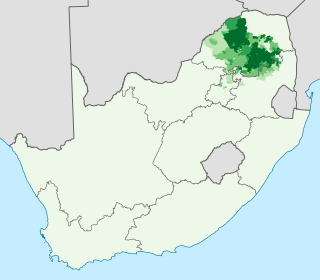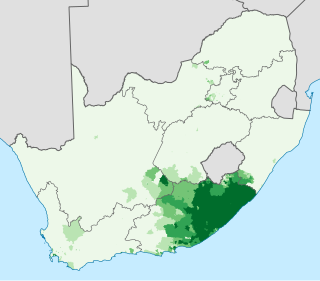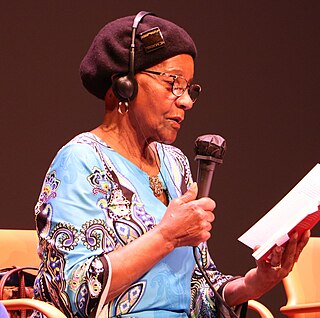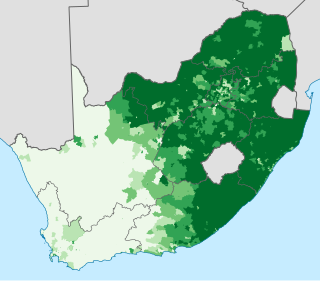Related Research Articles

Sesotho sa Leboa is a Sotho-Tswana language group spoken in the northeastern provinces of South Africa, most commonly in Mpumalanga, Gauteng and the Limpopo provinces. It is also known by Pedi or Sepedi and holds the status of an official language in South Africa.

Zulu, or IsiZulu as an endonym, is a Southern Bantu language of the Nguni branch spoken and indigenous to Southern Africa. It is the language of the Zulu people, with about 13.56 million native speakers, who primarily inhabit the province of KwaZulu-Natal in South Africa. Zulu is the most widely spoken home language in South Africa, and it is understood by over 50% of its population. It became one of South Africa's 12 official languages in 1994.

Xhosa, formerly spelled Xosa and also known by its local name isiXhosa, is a Nguni language, indigenous to Southern Africa and one of the official languages of South Africa and Zimbabwe. Xhosa is spoken as a first language by approximately 10 million people and as a second language by another 10 million, mostly in South Africa, particularly in Eastern Cape, Western Cape, Northern Cape and Gauteng, and also in parts of Zimbabwe and Lesotho. It has perhaps the heaviest functional load of click consonants in a Bantu language, with one count finding that 10% of basic vocabulary items contained a click.

Sindiwe Magona is a South African writer.

Kraal is an Afrikaans and Dutch word, also used in South African English, for an enclosure for cattle or other livestock, located within a Southern African settlement or village surrounded by a fence of thorn-bush branches, a palisade, mud wall, or other fencing, roughly circular in form. It is similar to a boma in eastern or central Africa.

At least thirty-five languages are spoken in South Africa, twelve of which are official languages of South Africa: Ndebele, Pedi, Sotho, South African Sign Language, Swazi, Tsonga, Tswana, Venda, Afrikaans, Xhosa, Zulu, and English, which is the primary language used in parliamentary and state discourse, though all official languages are equal in legal status. In addition, South African Sign Language was recognised as the twelfth official language of South Africa by the National Assembly on 3 May 2023. Unofficial languages are protected under the Constitution of South Africa, though few are mentioned by any name.

Mhlophe, known as Gcina Mhlophe, is a South African storyteller, writer, playwright, and actress. In 2016, she was listed as one of BBC's 100 Women. She tells her stories in four of South Africa's languages: English, Afrikaans, Zulu and Xhosa, and also helps to motivate children to read.

South African Bantu-speaking peoples represent the majority indigenous ethno-racial group of South Africans. Occasionally grouped as Bantu, the term itself is derived from the English word "people", common to many of the Bantu languages. The Oxford Dictionary of South African English describes "Bantu", when used in a contemporary usage or racial context as "obsolescent and offensive", because of its strong association with the "white minority rule" with their Apartheid system. However, Bantu is used without pejorative connotations in other parts of Africa and is still used in South Africa as the group term for the language family.
Mhlobo Wabantwana Jadezweni is a South African academic and author. He has degrees from the University of Fort Hare and Stellenbosch University. He has been attached to the Department of African Languages at Stellenbosch University since 1983, where he teaches Xhosa literature and language, and studies isiXhosa poetry. He has served on various Xhosa language boards since 1984 and is chairperson of the isiXhosa Lexicography Unit at Fort Hare.

During the Napoleonic Wars, the Cape Colony was annexed by the British and officially became their colony in 1815. Britain encouraged settlers to the Cape, and in particular, sponsored the 1820 Settlers to farm in the disputed area between the colony and the Xhosa in what is now the Eastern Cape. The changing image of the Cape from Dutch to British excluded the Dutch farmers in the area, the Boers who in the 1820s started their Great Trek to the northern areas of modern South Africa. This period also marked the rise in power of the Zulu under their king Shaka Zulu. Subsequently, several conflicts arose between the British, Boers and Zulus, which led to the Zulu defeat and the ultimate Boer defeat in the Second Anglo-Boer War. However, the Treaty of Vereeniging established the framework of South African limited independence as the Union of South Africa.

The Nguni people are a linguistic cultural group of Bantu cattle herders who migrated from central Africa into Southern Africa, made up of ethnic groups formed from hunter-gatherer pygmy and proto-agrarians, with offshoots in neighboring colonially-created countries in Southern Africa. Swazi people live in both South Africa and Eswatini, while Ndebele people live in both South Africa and Zimbabwe.
Marguerite Poland OIS is a South African writer and author of eleven children's books.

The following outline is provided as an overview of and topical guide to South Africa:

The South African Wars, including but also known as the Confederation Wars, were a series of wars that occurred in the southern portion of the African continent between 1879 and 1915. Ethnic, political, and social tensions between European colonial powers and indigenous Africans led to increasing hostilities, culminating in a series of wars and revolts, which had lasting repercussions on the entire region. A key factor behind the growth of these tensions was the pursuit of commerce and resources, both by countries and individuals, especially following the discoveries of gold in the region in 1862 and diamonds in 1867.

The Hlubi people or AmaHlubi are an AmaMbo ethnic group native to Southern Africa, with the majority of population found in Gauteng, Mpumalanga, KwaZulu-Natal and Eastern Cape provinces of South Africa.

The Maskew Miller Longman Literature Awards were established in c.1980 by Maskew Miller Longman, an educational publishing company in South Africa. The competition was created to encourage writing in all of South Africa's 11 official languages, with a particular focus on literature suitable for a youth audience.
Bhaca, or IsiBhaca (Baca) is a Bantu language of South Africa. Traditionally considered a dialect of Swati, it is closer to Xhosa, Phuthi and Zulu. It is spoken southeast of Lesotho, where Sotho, Xhosa and Zulu meet, mainly around Mount Frere, Mzimkhulu, and to a lesser extent in Mount Ayliff, Matatiele, Harding, Bulwer, Underberg, Highflats, Umzinto, Umzumbe and Ixopo.
The University of Johannesburg Prize for South African Writing, also known as the UJ Prize, is awarded annually by the University of Johannesburg (UJ) for the best creative works in each of five categories: English, Afrikaans, Zulu, Northern Sotho, and Literary Translation. There are usually two prizes, a main prize and a debut prize, in each category. The prizes are not linked to a specific genre, and each year's prize rewards work published in the previous year. The winner of the main prize in each category receives R70 000, the winner of each debut prize receives R35 000, and the winner of the Literary Translation prize receives R50 000.
The Revd Professor Peter Tshobisa Mtuze is a poet, priest and academic. He worked as an interpreter in the law courts of the old South Africa, a radio announcer, a salesperson for a publishing company, a civil servant in the homeland government structures, a lecturer at Unisa, an Editor in Chief of the Greater Dictionary of isiXhosa at Fort Hare, before joining Rhodes University as Professor and Head of the isiXhosa Department.

Shweshwe is a printed dyed cotton fabric widely used for traditional Southern African clothing. Originally dyed indigo, the fabric is manufactured in a variety of colours and printing designs characterised by intricate geometric patterns. Due to its popularity, shweshwe has been described as the denim, or tartan, of South Africa.
References
- ↑ Shone, Leah (28 May 2021). "Creative Collaboration". Get It Ballito.Umhlanga.
- ↑ Stewart, Dianne (2019). The Gift of the Sun: A Tale from South Africa[Isipho selanga: ibali laseMzantsi Afrika] (in Xhosa). Translated by Guzula, Xolisa.
- ↑ Stewart, Dianne (1991). The Mealie-cob Children[Abantwana bezikhwebu zommbila] (in Zulu). Translated by Msimang, C.T.
- ↑ Stewart, Dianne (1995). The Cry of the Guinea-fowl[Sello sa kgaka] (in Southern Sotho). Translated by Mohapi, T.W.D.
- ↑ Stewart, Dianne (1994). The Dove[Die duif] (in Afrikaans). Translated by Kotze, Suzette.
- ↑ Stewart, Dianne (1996). The Gift of the Sun: A Tale from South Africa[Les graines du soleil: un conte d'Afrique du Sud] (in French). Translated by Lager, Claude.
- ↑ Stewart, Dianne (1996). The Gift of the Sun: A Tale from South Africa[El regalo del sol: un cuento de Sudáfrica] (in Spanish). Translated by Uribe, Verónica.
- ↑ Stewart, Dianne (2020). The Gift of the Sun: A Tale from South Africa[Solens gåvor] (in Swedish). Translated by Forsén, Ulla.
- ↑ "Old Rhodian Authors 1970 to 1979". www.ru.ac.za. Rhodes University. 5 September 2011. Retrieved 17 October 2021.
- ↑ Naidu, Samantha (2000). Transcribing Tales, Creating Cultural Identities: An Analysis of Selected Written English Texts of Xhosa Folktales (MA). Rhodes University. p. 121.
- ↑ Puku Children's Literature Foundation: Jude Daly
- ↑ Heale, Jay (2004). "Dianne Stewart: Writer with a Sense of Purpose". In Lehman, Barbara (ed.). Creating Books for the Young in the New South Africa: Essays on Authors and Illustrators of Children's and Young Adult Literature. McFarland. pp. 226–233. ISBN 9780786475513.
- ↑ Daymond, M.J., ed. (2003). Women Writing Africa: The Southern Region. pp. 463–467, 534.
- ↑ University of Cape Town Centre for Extra-Mural Studies: Summer School 2021
- ↑ Geist, Elena (14 May 2015). "Words, faith and food". North Coast Courier.